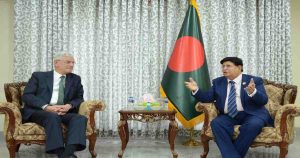UN Assistant Secretary-General for Humanitarian Affairs Ursula Mueller has called for strengthening humanitarian action for Rohingyas based on the rights and needs in line with international law and humanitarian principles.
“Protecting the most vulnerable people in Myanmar must be at the heart of the humanitarian response by the international community, national aid organisations and the government,” said Mueller at the conclusion of a six-day mission to Myanmar on Sunday.
She said wherever they are in the country and regardless of their ethnicity, religion and citizenship status, all need to work together to ensure that no vulnerable conflict-affected people are deprived of safe and sustained access to humanitarian protection and assistance. “No-one in Myanmar should be left behind on the path towards a better future.”
Mueller, also Deputy Emergency Relief Coordinator in the United Nations Office for the Coordination of Humanitarian Affairs (OCHA), said the conditions for the dignified, voluntary, and sustainable return of refugees and positive outcomes for internally displaced people in camps slated for closure can only be reached if the critical issues of freedom of movement, social cohesion, livelihoods, and access to services are addressed.
At the outset of her mission, she met State Counsellor Aung San SuuKyi, according to the press release shared by ReliefWeb, the leading humanitarian information source on global crises and disasters.
They discussed the importance of ending conflict and of strengthening peace and reconciliation efforts.
Mueller reaffirmed the commitment of the United Nations to supporting peace, stability, and development in Myanmar.
She offered the continued support of the United Nations and its humanitarian partners to ensure that all people affected by conflict and natural disasters get the humanitarian protection and assistance they need.
They agreed on the importance of strengthening national capacities. Mueller noted the efforts being made by the UN to strengthen the nexus between humanitarian, development and peace-building efforts.
The Deputy Emergency Relief Coordinator also met the Ministers of Defence, Border Affairs, International Cooperation, and the Minister of Social Welfare, Relief and Resettlement.
The meetings with the Union government were an opportunity to discuss humanitarian challenges in Rakhine, Kachin, and Shan states as well as the collaborative efforts of the international community and the government on disaster preparedness efforts.
In Rakhine State, the Deputy Emergency Relief Coordinator visited camps where about 130,000 people, most of whom identify themselves as Rohingya, remain confined to deplorable conditions after almost six years of displacement.
“There’s a humanitarian crisis on both sides of the Bangladesh-Myanmar border that is affecting the world’s largest group of stateless people,” said Mueller.
She said the Advisory Commission on Rakhine State has provided an important roadmap towards a better future for all communities in Rakhine State, but its recommendations need to be implemented holistically and impartially, in the spirit that they were written.
“Humanitarian access in Myanmar has significantly worsened in the past year, not only in Rakhine but also in Kachin and Shan States. When you cut that humanitarian lifeline, there’s a very real human impact,” said Mueller.




